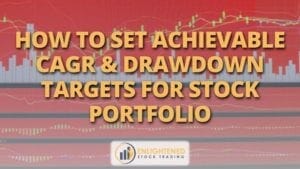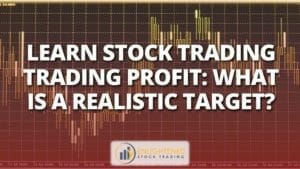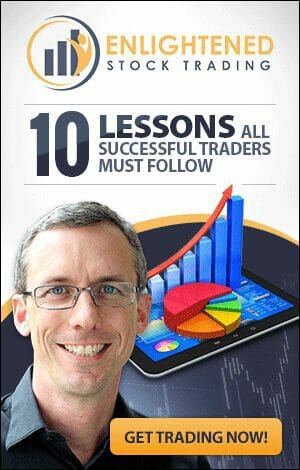Show Full Transcript
Hi, it’s Adrian here and look, someone challenged me today, one of my facebook posts about my claim that stock trading is scientific that was saying that stock trading is a skill and is absolutely not scientific at all. So I recorded this quick video just to share my perspective about why I believe trading can be scientific and how you can use scientific principles to improve your stock trading. Hope you enjoy. And look, I think it’s a perfectly valid argument. It depends a lot on the way you trade a thought. I record this quick video just to share how I believe that you can bring the scientific approach into stock trading is a, all of my trading is purely systematic. That means is rules based and those rules are being tested before they’re being used. So what I do is I’m creating systems or sets of rules that tell me when to buy and when to sell.
And I’m back-testing those over 10, 20, 30 years of stock market history to make sure that they work. Now, the scientific aspect to this as much like a, an experiment that we would’ve done in chemistry or physics in high school where you have a hypothesis and you design an experiment to prove or disprove it. Now, how does that come into stock trading systems? Well, what I’m doing is saying, you know, if I’ve, let’s say we’ve got a simple moving average crossover system, so we buy when I’m moving, every short term, moving average crosses above a long-term moving average and we sell when the short term moving average crosses below the long-term moving average. Now in of itself. That is not a good stock trading system and I absolutely don’t recommend it, but let’s just say that we were starting with that as a premise and we had a hypothesis that if the broader stock market, let’s say the stock market index was going up, that the signals from the moving average crossover system on individual stocks were better quality signals.
So what would we do? We design a test, a back test to validate or to prove or disprove that hypothesis. So we put in a rule that says if the index is above the moving average, then use the crossover system. Otherwise don’t we could those into a, a software platform such as amy broker, my clients and myself will use amy broker and then run a back test and you could test out of a 10, 20, 30 years of stock market history in all different markets around the world and validate whether or not that actually improves your profitability. So it’s a hypothesis followed by an experiment design that is allowing you to test whether or not that hypothesis is valid and you can apply this to all sorts of aspects of your stock trading. So it could be to do with your trend filters. It could be to do with your precise entry triggers or it could be to do with your exits.
It can even be to do with, how many positions you hold in the market or how much risk you take on each of each of those positions. And say, my approach to stock trading what I teach and the way I do it in my own portfolio for the last 15 years now is all systematic. So, and those, those systems that I use are rules that I’ve and tested, using, using back-testing and and I’ve tested those over thousands of trades, over many, many markets to make sure that they work. So it’s more scientific than a chart reading for instance. So let’s say that you were at a classical chat reader and that’s how you made your stock trading decisions. You’d be looking at a chart and making judgment calls about where the trend was and when to enter. Or You could be a technical analyst and you’re looking at lots of different indicators and let’s say you have your chart and you plot all your favorite indicators and you know, look at three or four indicators and you weigh up the weight of the evidence and you make a decision.
Both of those are somewhat subjective, in which case I can completely agree with you. Trading is a skill if you approach it that way. But if you approach it systematically and you’re building objective rules to determine when you buy and when you sell, how you, when you enter and exit the market, and how much you buy, your position sizing, if that’s all defined by objective roles that you’ve back-tested, it’s much more scientific than skill based. Now, both ways can work. Don’t get me wrong, I’m so, I’m not necessarily challenging your trading approach, but what I’ve found in my experience, teaching and interacting with hundreds of traders is that most people find it really hard to develop that skill to recharge and to use indicators subjectively. and I just end up losing all of their money. I’ve had much more success in my own account and with students learning how to back-test and trade systematically and in my view that’s far more scientific, thus the claim in the posts that you’ve commented on. So hope that helps clear it up. If you have any questions, feel free to comment below and, or click on the link and opt in and little bit more about my training approach. That helps. Bye for now.









Hi Adrian,
I would agree with what you said.
After all how can it be called a skill if you the outcome of the skill is not measured.
People may believe they are skilled but the measuring of their selections and profitability gives an indication if they have skill or not.
With all the biases that we are susceptical to it is easy to believe you are skilled as you discount the losing trades and only remember the winning trades, this is what many people do so to make themselves appear successful. No one wants to be called a loser. It doesn’t bother me, I like to see peoples reaction when I say I only get 40% (38.18% to be precise) of my picks right. The need to be right is a very strong bias. I’ve seen people at the ATAA claiming they are 80% right and I smile as I can see that bias playing out.
Hi Neil,
I absolutely agree… I also get some perverse pleasure from telling people I get 30-40% of my trades right. That makes most people’s heads explode and usually ends the conversation. Those people who get curious at that point and start asking questions are the ones that will make good traders, so I explain how expectancy and systems work. For those who argue with me I don’t try to explain because their biases are probably too strong for them to become good traders unless they drop their need to be right in favour of curiosity.
Well done
Adrian